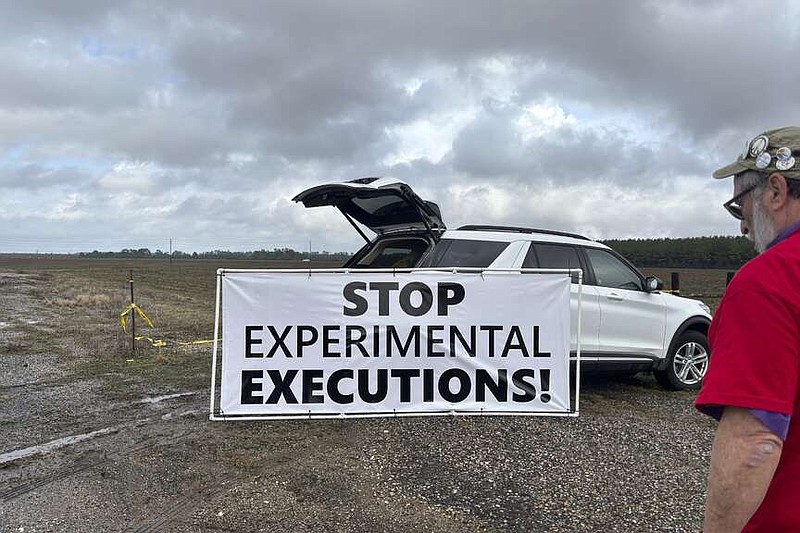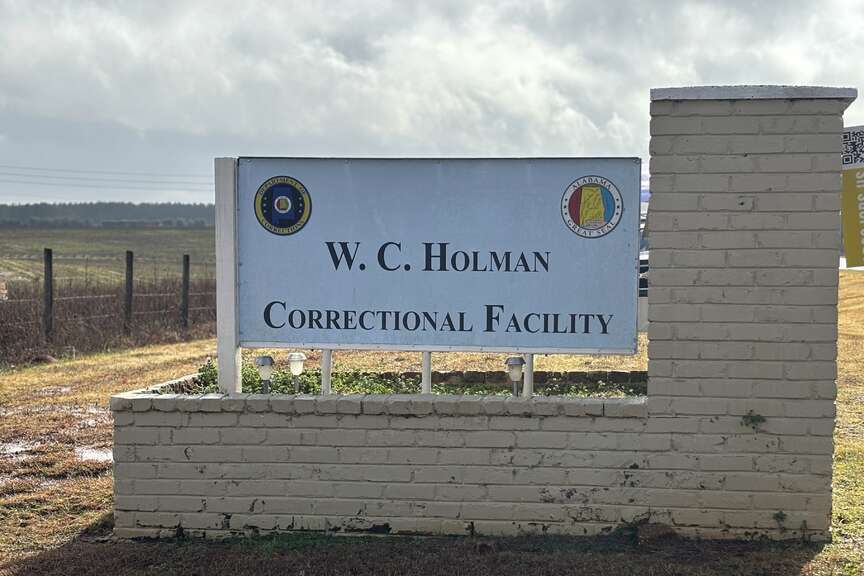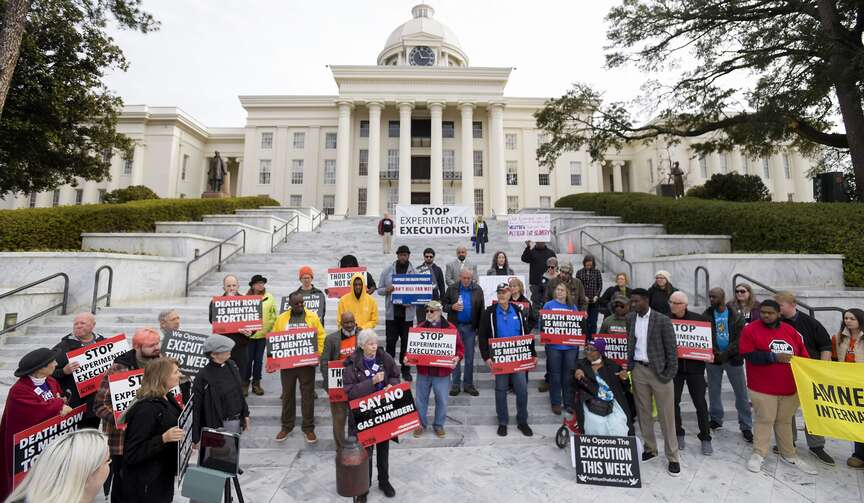ATMORE, Ala. -- Alabama executed a convicted murderer with nitrogen gas Thursday, putting him to death with a first-of-its-kind method that once again put the U.S. at the forefront of the debate over capital punishment. The state said the method would be humane, but critics called it cruel and experimental.
Officials said Kenneth Eugene Smith, 58, was pronounced dead at 8:25 p.m. at an Alabama prison after breathing pure nitrogen gas through a face mask to cause oxygen deprivation. It marked the first time that a new execution method has been used in the United States since lethal injection, now the most commonly used method, was introduced in 1982.
The execution took about 22 minutes, and Smith appeared to remain conscious for several minutes. For at least two minutes, he appeared to shake and writhe on the gurney, sometimes pulling against the restraints. That was followed by several minutes of heavy breathing, until breathing was no longer perceptible.
In a final statement, Smith said: "Tonight Alabama causes humanity to take a step backwards. ... I'm leaving with love, peace and light."
He made the "I love you sign" with his hands toward family members who were witnesses. "Thank you for supporting me. Love, love all of you," Smith said.
The state had previously attempted to execute Smith, who was convicted of a 1988 murder-for-hire, in 2022, but the lethal injection was called off at the last minute because authorities couldn't connect an IV line.
The execution came after a last-minute legal battle in which Smith's attorneys contended the state was making him the test subject for an experimental execution method that could violate the constitutional ban on cruel and unusual punishment. Federal courts rejected Smith's bid to block it, with the latest ruling coming Thursday night from the U.S. Supreme Court.
Justice Sonia Sotomayor, who along with two other liberal justices dissented, wrote: "Having failed to kill Smith on its first attempt, Alabama has selected him as its 'guinea pig' to test a method of execution never attempted before. The world is watching."
The majority justices did not issue any statements.
The state had predicted the nitrogen gas would cause unconsciousness within seconds and death within minutes. A state attorney told the 11th Circuit Court of Appeals that it will be "the most painless and humane method of execution known to man."
But some doctors and organizations have raised alarm, and Smith's attorneys had asked the Supreme Court to halt the execution to review claims that the method violates the constitutional ban on cruel and unusual punishment and deserves more legal scrutiny before it is used on a person.
In her dissent, Sotomayor wrote that Alabama has shrouded its execution protocol in secrecy, releasing only a heavily redacted version. She also said Smith should be allowed to obtain evidence about the execution protocol and to proceed with his legal challenge.
Justice Elena Kagan wrote a separate dissent and was joined by Justice Ketanji Brown Jackson.
Smith was one of two men convicted in the 1988 murder-for-hire slaying of Elizabeth Sennett. Prosecutors said he and the other man were each paid $1,000 to kill Sennett on behalf of her pastor husband, who was deeply in debt and wanted to collect on insurance.
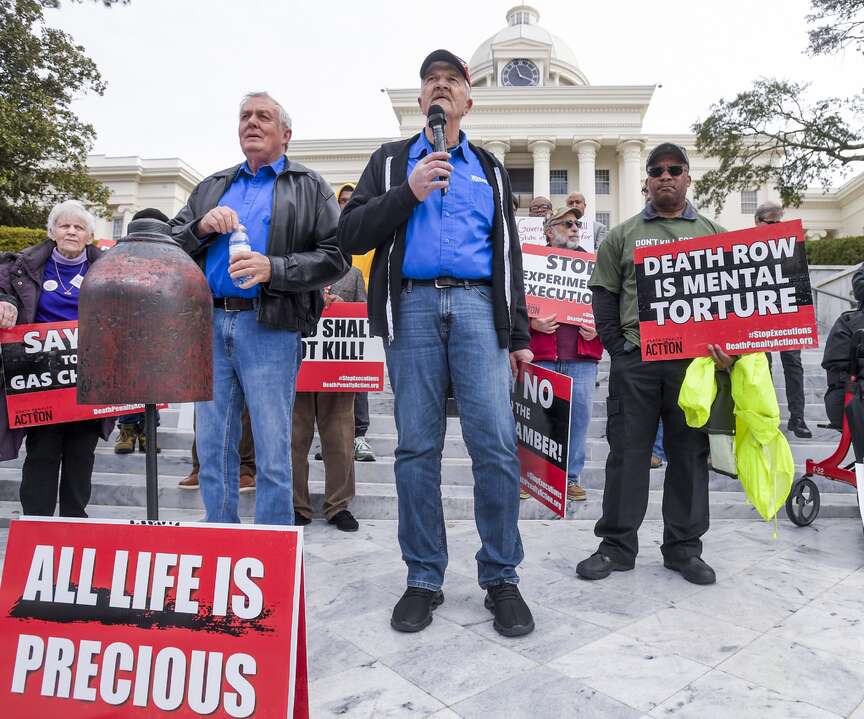 Former death row inmates who were exonerated, from left, Randall Padgent, Gary Drinkard and Ron Wright, were among the nearly one hundred protestors gathered at the state capitol building in Montgomery, Ala., on Tuesday Jan. 23, 2024, to ask Governor Kay Ivey to stop the planned execution of Kenneth Eugene Smith. (Mickey Welsh/The Montgomery Advertiser via AP)
Former death row inmates who were exonerated, from left, Randall Padgent, Gary Drinkard and Ron Wright, were among the nearly one hundred protestors gathered at the state capitol building in Montgomery, Ala., on Tuesday Jan. 23, 2024, to ask Governor Kay Ivey to stop the planned execution of Kenneth Eugene Smith. (Mickey Welsh/The Montgomery Advertiser via AP)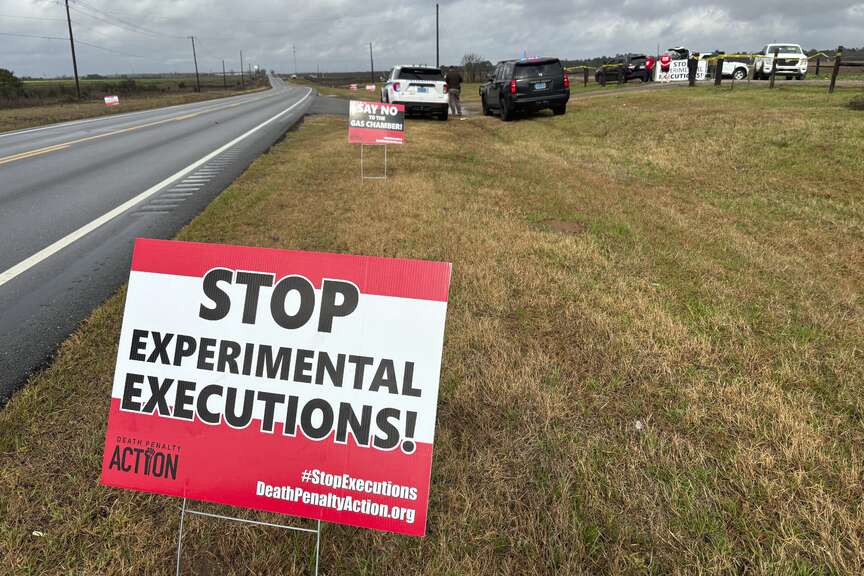 Anti-death penalty activists place signs along the road heading to Holman Correctional Facility in Atmore, Ala., ahead of the scheduled execution of Kenneth Eugene Smith on Thursday, Jan. 25, 2024. The state plans to put Smith to death with nitrogen gas, the first time the new method has been used in the United States. (AP Photo/Kim Chandler)
Anti-death penalty activists place signs along the road heading to Holman Correctional Facility in Atmore, Ala., ahead of the scheduled execution of Kenneth Eugene Smith on Thursday, Jan. 25, 2024. The state plans to put Smith to death with nitrogen gas, the first time the new method has been used in the United States. (AP Photo/Kim Chandler)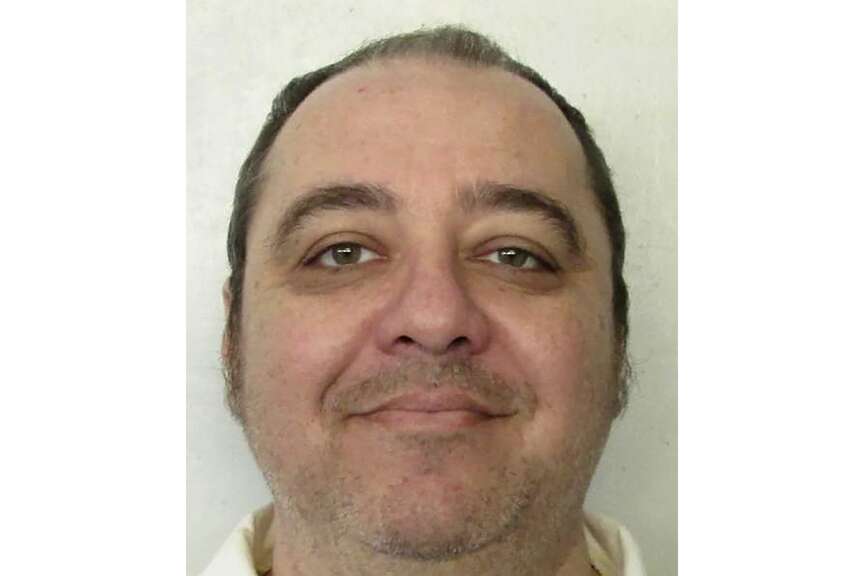 FILE - This undated photo provided by the Alabama Department of Corrections shows inmate Kenneth Eugene Smith, who was convicted in a 1988 murder-for-hire slaying of a preacher's wife. Alabama will be allowed to put Smith to death with nitrogen gas, a federal appeals court ruled Wednesday, Jan. 24, 2024, refusing to block what would be the nation's first execution by a new method since 1982. Alabama says it plans to replace the 58-year-old's breathing air with nitrogen gas on Thursday, Jan. 25, rendering him unconscious within seconds and killing him within minutes. (Alabama Department of Corrections via AP, File)
FILE - This undated photo provided by the Alabama Department of Corrections shows inmate Kenneth Eugene Smith, who was convicted in a 1988 murder-for-hire slaying of a preacher's wife. Alabama will be allowed to put Smith to death with nitrogen gas, a federal appeals court ruled Wednesday, Jan. 24, 2024, refusing to block what would be the nation's first execution by a new method since 1982. Alabama says it plans to replace the 58-year-old's breathing air with nitrogen gas on Thursday, Jan. 25, rendering him unconscious within seconds and killing him within minutes. (Alabama Department of Corrections via AP, File) Anti-death penalty activists place signs along the road heading to Holman Correctional Facility in Atmore, Ala., ahead of the scheduled execution of Kenneth Eugene Smith on Thursday, Jan. 25, 2024. The state plans to put Smith to death with nitrogen gas, the first time the new method has been used in the United States. (AP Photo/Kim Chandler)
Anti-death penalty activists place signs along the road heading to Holman Correctional Facility in Atmore, Ala., ahead of the scheduled execution of Kenneth Eugene Smith on Thursday, Jan. 25, 2024. The state plans to put Smith to death with nitrogen gas, the first time the new method has been used in the United States. (AP Photo/Kim Chandler)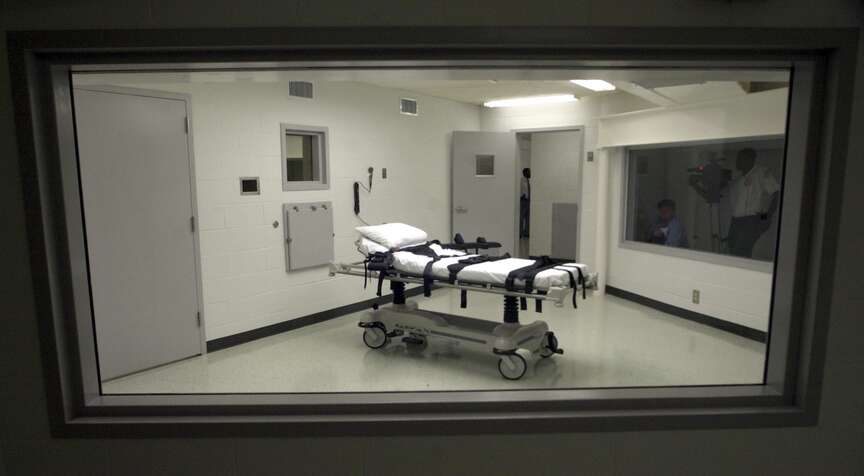 FILE - Alabama's lethal injection chamber at Holman Correctional Facility in Atmore, Ala., is pictured in this Oct. 7, 2002 file photo. Alabama will be allowed to put an inmate to death with nitrogen gas, a federal appeals court ruled Wednesday, Jan. 24, 2024, refusing to block what would be the nation's first execution by a new method since 1982. Alabama says it plans to replace Eugene Smith's, 58, breathing air with nitrogen gas Thursday, Jan. 25, rendering him unconscious within seconds and killing him within minutes. (AP Photo/Dave Martin, File)
FILE - Alabama's lethal injection chamber at Holman Correctional Facility in Atmore, Ala., is pictured in this Oct. 7, 2002 file photo. Alabama will be allowed to put an inmate to death with nitrogen gas, a federal appeals court ruled Wednesday, Jan. 24, 2024, refusing to block what would be the nation's first execution by a new method since 1982. Alabama says it plans to replace Eugene Smith's, 58, breathing air with nitrogen gas Thursday, Jan. 25, rendering him unconscious within seconds and killing him within minutes. (AP Photo/Dave Martin, File)